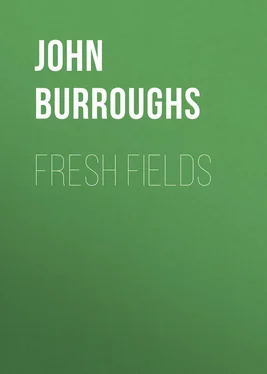John Burroughs - Fresh Fields
Здесь есть возможность читать онлайн «John Burroughs - Fresh Fields» — ознакомительный отрывок электронной книги совершенно бесплатно, а после прочтения отрывка купить полную версию. В некоторых случаях можно слушать аудио, скачать через торрент в формате fb2 и присутствует краткое содержание. Жанр: foreign_antique, foreign_prose, Историческая проза, на английском языке. Описание произведения, (предисловие) а так же отзывы посетителей доступны на портале библиотеки ЛибКат.
- Название:Fresh Fields
- Автор:
- Жанр:
- Год:неизвестен
- ISBN:нет данных
- Рейтинг книги:3 / 5. Голосов: 1
-
Избранное:Добавить в избранное
- Отзывы:
-
Ваша оценка:
- 60
- 1
- 2
- 3
- 4
- 5
Fresh Fields: краткое содержание, описание и аннотация
Предлагаем к чтению аннотацию, описание, краткое содержание или предисловие (зависит от того, что написал сам автор книги «Fresh Fields»). Если вы не нашли необходимую информацию о книге — напишите в комментариях, мы постараемся отыскать её.
Fresh Fields — читать онлайн ознакомительный отрывок
Ниже представлен текст книги, разбитый по страницам. Система сохранения места последней прочитанной страницы, позволяет с удобством читать онлайн бесплатно книгу «Fresh Fields», без необходимости каждый раз заново искать на чём Вы остановились. Поставьте закладку, и сможете в любой момент перейти на страницу, на которой закончили чтение.
Интервал:
Закладка:
The greater activity and abundance of the earthworm, as disclosed by Darwin, probably has much to do with the smoothness and fatness of those fields when contrasted with our own. This little yet mighty engine is much less instrumental in leavening and leveling the soil in New England than in Old. The greater humidity of the mother country, the deep clayey soil, its fattening for ages by human occupancy, the abundance of food, the milder climate, etc., are all favorable to the life and activity of the earthworm. Indeed, according to Darwin, the gardener that has made England a garden is none other than this little obscure creature. It plows, drains, airs, pulverizes, fertilizes, and levels. It cannot transport rocks and stone, but it can bury them; it cannot remove the ancient walls and pavements, but it can undermine them and deposit its rich castings above them. On each acre of land, he says, "in many parts of England, a weight of more than ten tons of dry earth annually passes through their bodies and is brought to the surface." "When we behold a wide, turf-covered expanse," he further observes, "we should remember that its smoothness, on which so much of its beauty depends, is mainly due to all the inequalities having been slowly leveled by worms."
The small part which worms play in this direction in our landscape is, I am convinced, more than neutralized by our violent or disrupting climate; but England looks like the product of some such gentle, tireless, and beneficent agent. I have referred to that effect in the face of the landscape as if the soil had snowed down; it seems the snow came from the other direction, namely, from below, but was deposited with equal gentleness and uniformity.
The repose and equipoise of nature of which I have spoken appears in the fields of grain no less than in the turf and foliage. One may see vast stretches of wheat, oats, barley, beans, etc., as uniform as the surface of a lake, every stalk of grain or bean the size and height of every other stalk. This, of course, means good husbandry; it means a mild, even-tempered nature back of it, also. Then the repose of the English landscape is enhanced, rather than marred, by the part man has played in it. How those old arched bridges rest above the placid streams; how easily they conduct the trim, perfect highways over them! Where the foot finds an easy way, the eye finds the same; where the body finds harmony, the mind finds harmony. Those ivy-covered walls and ruins, those finished fields, those rounded hedge-rows, those embowered cottages, and that gray, massive architecture, all contribute to the harmony and to the repose of the landscape. Perhaps in no other country are the grazing herds so much at ease. One's first impression, on seeing British fields in spring or summer, is that the cattle and sheep have all broken into the meadow and have not yet been discovered by the farmer; they have taken their fill, and are now reposing upon the grass or dreaming under the trees. But you presently perceive that it is all meadow or meadow-like; that there are no wild, weedy, or barren pastures about which the herds toil; but that they are in grass up to their eyes everywhere. Hence their contentment; hence another element of repose in the landscape.
The softness and humidity of the English climate act in two ways in promoting that marvelous greenness of the land, namely, by growth and by decay. As the grass springs quickly, so its matured stalk or dry leaf decays quickly. No field growths are desiccated and preserved as with us; there are no dried stubble and seared leaves remaining over the winter to mar and obscure the verdancy of spring. Every dead thing is quickly converted back to vegetable mould. In the woods, in May, it is difficult to find any of the dry leaves of the previous autumn; in the fields and copses and along the highways, no stalk of weed or grass remains; while our wild, uplying pastures and mountain-tops always present a more or less brown and seared appearance from the dried and bleached stalks of the growth of the previous year, through which the fresh springing grass is scarcely visible. Where rain falls on nearly three hundred days in the year, as in the British islands, the conversion of the mould into grass, and vice versa , takes place very rapidly.
II
ENGLISH WOODS: A CONTRAST
One cannot well overpraise the rural and pastoral beauty of England – the beauty of her fields, parks, downs, holms. In England you shall see at its full that of which you catch only glimpses in this country, the broad, beaming, hospitable beauty of a perfectly cultivated landscape. Indeed, to see England is to take one's fill of the orderly, the permanent, the well-kept in the works of man, and of the continent, the beneficent, the uniform, in the works of nature. It is to see the most perfect bit of garden lawn extended till it covers an empire; it is to see the history of two thousand years written in grass and verdure, and in the lines of the landscape; a continent concentrated into a state, the deserts and waste places left out, every rood of it swarming with life; the pith and marrow of wide tracts compacted into narrow fields and recruited and forwarded by the most vigilant husbandry. Those fields look stall-fed, those cattle beam contentment, those rivers have never left their banks; those mountains are the paradise of shepherds; those open forest glades, half sylvan, half pastoral, clean, stately, full of long vistas and cathedral-like aisles, – where else can one find beauty like that? The wild and the savage flee away. The rocks pull the green turf over them like coverlids; the hills are plump with vegetable mould, and when they bend this way or that, their sides are wrinkled and dimpled like the forms of fatted sheep. And fatted they are; not merely by the care of man, but by the elements themselves; the sky rains fertility upon them; there is no wear and tear as with our alternately flooded, parched, and frozen hilltops; the soil accumulates, the mould deepens; the matted turf binds it and yearly adds to it.
All this is not simply because man is or has been so potent in the landscape (this is but half the truth), but because the very mood and humor of Nature herself is domestic and human. She seems to have grown up with man and taken on his look and ways. Her spirit is that of the full, placid stream that you may lead through your garden or conduct by your doorstep without other danger than a wet sill or a soaked flower-plot, at rare intervals. It is the opulent nature of the southern seas, brought by the Gulf Stream, and reproduced and perpetuated here under these cool northern skies, the fangs and the poison taken out; full, but no longer feverish; lusty, but no longer lewd.
Yet there is a certain beauty of nature to be had in much fuller measure in our own country than in England, – the beauty of the wild, the aboriginal, – the beauty of primitive forests, – the beauty of lichen-covered rocks and ledges. The lichen is one of the lowest and humblest forms of vegetable growth, but think how much it adds to the beauty of all our wild scenery, giving to our mountain walls and drift bowlders the softest and most pleasing tints. The rocky escarpments of New York and New England hills are frescoed by Time himself, painted as with the brush of the eternal elements. But the lichen is much less conspicuous in England, and plays no such part in her natural scenery. The climate is too damp. The rocks in Wales and Northumberland and in Scotland are dark and cold and unattractive. The trees in the woods do not wear the mottled suit of soft gray ours do. The bark of the British beech is smooth and close-fitting, and often tinged with a green mould. The Scotch pine is clad as in a ragged suit of leather. Nature uses mosses instead of lichens. The old walls and housetops are covered with moss – a higher form of vegetation than lichens. Its decay soon accumulates a little soil or vegetable mould, which presently supports flowering plants.
Читать дальшеИнтервал:
Закладка:
Похожие книги на «Fresh Fields»
Представляем Вашему вниманию похожие книги на «Fresh Fields» списком для выбора. Мы отобрали схожую по названию и смыслу литературу в надежде предоставить читателям больше вариантов отыскать новые, интересные, ещё непрочитанные произведения.
Обсуждение, отзывы о книге «Fresh Fields» и просто собственные мнения читателей. Оставьте ваши комментарии, напишите, что Вы думаете о произведении, его смысле или главных героях. Укажите что конкретно понравилось, а что нет, и почему Вы так считаете.












